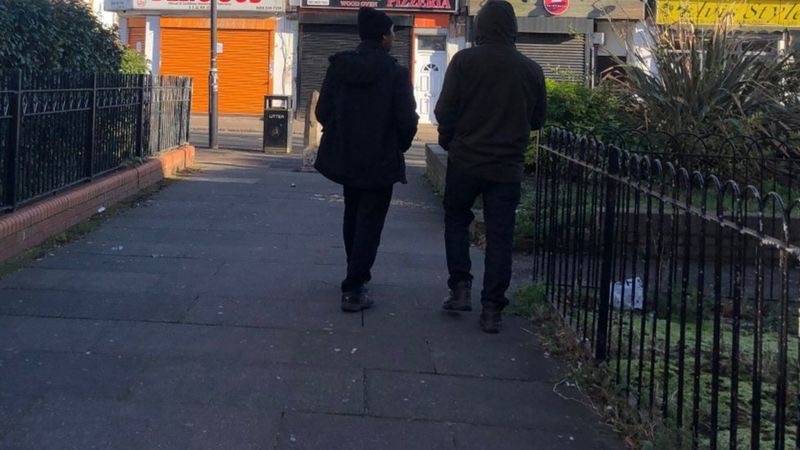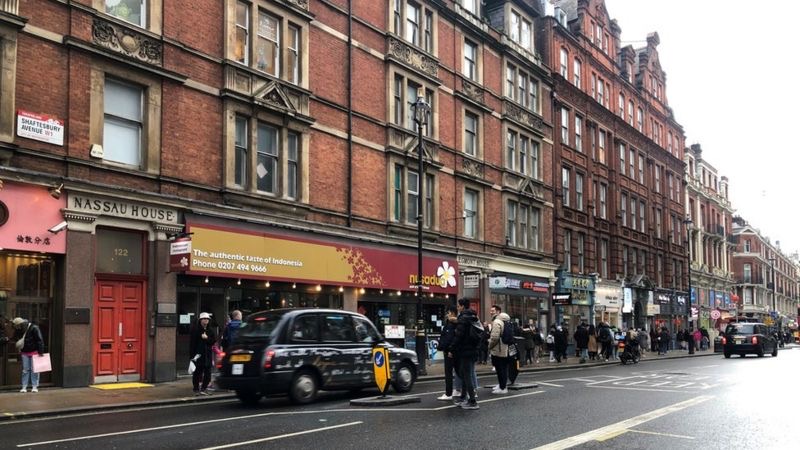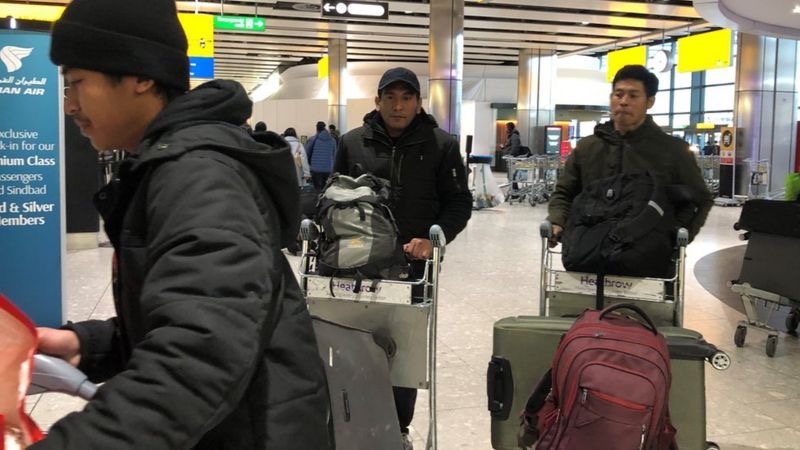(Informal translation from Indonesian language original version)
Rohmatin Bonasir, BBC News Indonesia, January 25, 2023
https://www.bbc.com/indonesia/dunia-64329724
IMAGE SOURCE,ROHMATIN BONASIR/BBC NEWS INDONESIA
Dozens of workers from Indonesia who previously worked on seasonal visas in the British plantation sector as fruit and vegetable pickers have persisted to remain in the UK even though the 2022 harvest season has ended and the six-month visa validity period has also expired.
They tried to get into illegal jobs, for example working in restaurant kitchens or as construction workers at the risk of being arrested by the British authorities. Others try to work officially by applying for asylum.
The Indonesian Embassy in London said “it has not received any information or reports of PMI seeking asylum from the British Government.”
To find out why Indonesian migrant workers (PMI) persist in living in the UK and how they live, I met them.
Stairs leading to a train platform at a south west London station, wet after rain. The day was gray and the sky was covered with clouds, like a winter situation. No sound of trains. Three men punched cards into the entrance machine as they headed for the platform.
Related link to past BBC story: Indonesian migrant workers in the UK: More than 200 people repatriated, some ‘unpaid and have to mortgage houses’ (https://www.bbc.com/indonesia/majalah-63860610)
I heard them conversing in Indonesian. I approached them to inform them that that day there was no train service at all. Train employees launched a strike in the period from late December 2022 to the start of the new year in an effort to raise wages in line with the soaring cost of living.
IMAGE SOURCE,ROHMATIN BONASIR/BBC NEWS INDONESIA

At the station that serves trains bound for London Waterloo, I met three PMIs who previously worked on plantations.
“We have been working here for three months. Previously we worked on plantations,” said Bayu, one of them. To protect his identity, his real name is not used in this article.
“How long will you be in England, sir?” ask me. “Wow, I don’t know yet. Until I collect fortune, sis,” he replied.
Bayu and his friends arrived in the UK at the end of July 2022 with seasonal work visas for the plantation sector. The visa is valid for six months and now the validity period has expired.
However, Bayu and his friends did not return to Indonesia. The reason is because the income from working on a new plantation can cover the departure costs, varying from IDR 65 million and even up to IDR 100 million more.
Become a construction worker in England
The income that just reached the break-even point, they said, was due to the delay in the departure schedule from Indonesia so that not long after they arrived in England, the harvest season was almost over. Fruits, such as strawberries, apples and raspberries, are becoming scarcer and this is reducing the income potential of pickers.
IMAGE SOURCE,ROHMATIN BONASIR/BBC NEWS INDONESIA


Because of the thorny bushes, blackberries are one of the most difficult fruits to pick, according to workers.
Answering BBC News Indonesia’s questions regarding the management of the seasonal worker visa scheme, on Friday (20/01) the British Ministry of Home Affairs, which among other things is in charge of foreign worker affairs, said, “The Seasonal Worker Visa has been in operation for three years and every year improvements are made to prevent exploitation and poor working conditions while the worker is in the UK.”
As for Bayu and his friends, they are faced with a complicated reality, changing the ticket date to return to Indonesia earlier but bearing additional costs and not being able to return their capital. Finally they took the risk of plunging into the black market. And they find opportunities as construction workers.
Same with plantations, employment in buildings before Brexit (Britain left the European Union organization) was filled by workers from eastern European countries. There are no restrictions on the movement of people and goods within the European Union, but once the UK leaves, EU citizens must follow immigration regulations like other citizens if they want to enter the UK.
Not all fruit pickers take the same path as Bayu. The majority of the more than 1,400 people have returned to Indonesia in waves, some with extra money, some still bearing debt, as BBC News Indonesia has reported in a report entitled Indonesian Migrant Workers in the UK: More than 200 people have been sent home, some ‘have not yet paid off their debts and must pawn the house’ .
Bayu and his friends are currently working on house renovations for a gross of £80 per day, about Rp.1.4 million at current exchange rates. If they worked five days a week, the gross wages would be £400 per week or £1,600 per month. This is equivalent to IDR 29 million, an amount that seems fantastic if they work in Indonesia.
But the cost of living in the UK is much higher than in Indonesia, almost 70% more expensive, according to livingcost.org , a site that compares the cost of living in 197 countries.
IMAGE SOURCE,ROHMATIN BONASIR/BBC NEWS INDONESIA

The daily fare for underground zones 1-4 in London is set at £11 or around Rp 200,000.
Bayu also has to pay for food, transportation and accommodation. To give you an idea, a takeaway portion of chicken fried rice costs around £6.70 (Rp 125,000). City bus fare £1.65 one way. Minimum room rent £ 100 (Rp 1.8 million) per person per week for rooms used in groups.
A gross wage of £80 per day is not small for an inexperienced construction worker. This is slightly above the UK national average minimum wage of £9.50 per hour. Those with experience receive a minimum of £150 per day.
Bayu admits that his current salary is almost commensurate with the income in the plantation as a fruit picker. In the first and second months, the fruit is still abundant, but from October to November the fruit becomes less, reducing potential income.
The UK Home Office admits that many seasonal workers only arrive in the UK in the middle of the year to harvest winter fruit and vegetables.
“They are entitled to remain employed as long as the visa is valid. Supply companies often transfer workers to other plantations, either at their own request or based on the needs of the plantation, which maximizes the worker’s earning potential and optimizes the duration of the visa which also benefits the plantation.”
But, how can Indonesian citizens work in the UK even though the visa has expired?
I headed to central London to follow three other Indonesian migrant workers. They want to find work. Two people – one girl and one boy – are related. The third person knew them because they had worked on a plantation.
IMAGE SOURCE,ROHMATIN BONASIR/BBC NEWS INDONESIA

The Chinatown area in London is the center of Asian culinary delights.
We agreed to meet at a corner in Chinatown, the Chinatown area in the middle of the city. There are many Chinese restaurants, Asian spice shops, cake shops and entertainment centers here. There are also Indonesian, Malaysian and Singaporean food restaurants.
Chinatown is crowded with visitors. The atmosphere became more lively with the red Chinese New Year lanterns that decorated the streets of Chinatown.Apply for asylum, hand over passport
The three Indonesian citizens (WNI) already have friends at a restaurant and were asked to wait for their boss to arrive. So while waiting, we went to the diner across the street to eat and shelter from the cold outside.
“I don’t want to live and work in England illegally. I want to earn a living for my child legally,” said worker Ana. His name is also pseudonym.
Therefore, Ana took a step that she called “never planned at all” and was a “sacrifice” for the sake of her baby.
Ana provides further explanation: “This is the easiest shortcut, just go through it”.
He applied for asylum. Her application is being processed, and while waiting for the results, Ana is given an application registration card (ARC) as proof of an asylum applicant.
IMAGE SOURCE,ROHMATIN BONASIR/BBC NEWS INDONESIA

Ana admitted that her move to apply for asylum in England was part of a mother’s sacrifice for her child.
The card contains conditions whether the holder may work or not. If it says ” no work ” or is not allowed to work, the applicant can apply for compensation to the government of £ 40.85 per person per week. Ana accepted the ARC conditional on not being allowed to work but she hastily applied to change the terms.
“Many people insult me by saying I don’t love Indonesia. It’s not a matter of loving my country or not. They are not in my position, they don’t understand what I’m going through,” Ana told me, journalist for BBC News Indonesia, Rohmatin Bonasir. Her eyes looked glassy.
Guidance from the UK Home Office, which oversees immigration, states that the majority of asylum applicants are not allowed to work while their applications are being processed. The reason is, “entering the UK for economic reasons is not the same as seeking asylum, and the two must be distinguished.”
“If time could be turned back, would you regret it?” ask me.
“Yes, sorry. If there is a way home, I want to go back. I did not know that during the interview I would have to hand over my passport. I thought I would just show my passport,” he replied.
The interview in question is an examination at the British Immigration Office to answer crucial questions about the reasons why the applicant is afraid to return to his country of origin so he needs asylum. The applicant brings identity documents, such as a passport and proof of address which are then kept by the Ministry of Home Affairs to process the application.
In the middle of our chat, Ana’s cell phone rings. He was called back to the restaurant because the boss was available to meet him.
I followed them down the busy main street to the restaurant, mingling with the Chinatown crowds in mid-January. Some are busy taking pictures of Chinese New Year decorations. There are those who go in and out of the restaurant. From the window looks full of diners restaurants.
IMAGE SOURCE,BBC NEWS INDONESIA

BBC News Indonesia journalist, Rohmatin Bonasir, met a number of Indonesian citizens in the Chinatown area in London. The restaurants in the area suck up a lot of manpower.
I stopped in front of the restaurant. Ana and two other Indonesian workers pass through a dark painted door. At first glance, there is nothing to distinguish whether they enter as restaurant visitors or job seekers.
Hiring foreigners without official documents is a big risk. If found guilty, the employer or company faces up to five years in prison and fines. Usually the size of the fine is £ 20,000 (about Rp. 370 million) per each illegal worker.
For workers without documents, the risk is also not light. He is threatened with arrest, detention and then deportation to his country of origin, although he will be given the opportunity to defend himself before being deported.
Looking for work, conned by brokers
By taking the subway for about 30 minutes from Chinatown to east London, I met Wawan – not his real name.
IMAGE SOURCE,INDONESIAN BBC

On average, interviewees interviewed by BBC News Indonesia said they were determined to make a living in England because they were already in debt for departure fees.
We talked in a tavern. He was confused thinking about the next step. This is because the work contract on the plantation ended last November and the seasonal work visa expired in early January. The return ticket to Indonesia has been forfeited.
“I worked quite briefly on the plantation because the fruit season was starting to end, while debts were piling up, so now I want to earn more money.
“The problem is that until now I haven’t been able to get a job. The longer I’m unemployed, the less money I have,” he said.
Based on his calculations, Wawan received IDR 90 million in income for about four months of work. However, the departure capital reached IDR 70 million. “So I only get Rp. 20 million, not deducting the cost of food and other needs,” he explained.
As the saying goes, Wawan admits that he was deceived by a broker who promised him a job in a brick factory. £400 (around Rp.7.4 million) has been handed over to the scalpers, but what has happened is false promises.
IMAGE SOURCE,BBC NEWS INDONESIA

Job offers like this circulate a lot among Indonesian workers in the UK.
If before departure to England PMIs had to pay handsomely to agents, in their destination countries they could not be separated from brokers. Even when they were still finishing their contract on the plantation, they were lured by outside jobs that looked tempting.
Brokers ask for payment up front. Even so, some workers admit that their wages are still being deducted every week. Their employers were notified that the deductions were requested directly by the agent.
Wawan worked as a dishwasher at a restaurant. Gross salary offered £400 per week for 12 hours per day, six working days. On average, this is 50% lower than the UMR provisions in England. But he doesn’t have a bargaining position because he doesn’t have any work documents.
Then he showed me his inn on the corner of a crossroads, not far from where we were talking. Narrow room, mini window. The mattress was on the floor with no pillows, no blankets even though it was -2 degrees Celsius outside.
“This is much better than the room I previously occupied in the cellar,” he said.
IMAGE SOURCE,ROHMATIN BONASIR/BBC NEWS INDONESIA

Every week that passes without work drains Wawan’s hard work while on the plantation. The biggest component is room rent.
In the basement were rooms with beds and mattresses, cement floors, thick dust covering all surfaces, walls with holes with no protection from cold or sound. A swishing sound could be heard from the washing machine beside the room.
The man over the age of 30 is racking his brain how to still be able to work in England. He exchanged ideas with his friends on Wednesday morning (18/01).
“First, I am struggling to find work abroad, how can I survive in other people’s lands. Second, this is because of undeniable debt demands,” said Wawan.
“So I am still open to all possibilities, as well as asylum,” he added.
With a trembling voice as if she was holding back tears, she added that her older sister in the village needed medical expenses, “I couldn’t bear to let her get sick.”The dilemma of returning home or seeking asylum
Another with Suhada – real name. The man from Cilacap experienced a great dilemma. After the picking season is over, he and some of his friends are still employed to take care of maintenance of equipment and facilities on the plantation.
The new work contract was completed on Tuesday (17/01). His visa expires the next day or Wednesday (18/01) and his ticket shows he has to return to Indonesia on Wednesday night.
But a friend of hers, who had already registered as an asylum seeker, suggested that Suhada follow her lead. The friend had even registered Suhada’s name. He had been due to meet the deadline for the interview at the Immigration Office in Croydon, London on Wednesday.
IMAGE SOURCE,ROHMATIN BONASIR/BBC NEWS INDONESIA

The Immigration Office under the British Ministry of Home Affairs serves applications for visas, asylum and other immigration matters.
He doesn’t have the flexibility to make a decision to go home according to schedule or to stay and let his ticket forfeit.
“I’m worried. I’ve bought chocolate snacks for the children,” he said, eight hours before the scheduled flight.
Her two children were waiting at home. So did his biological mother. The three figures appeared many times in his conversation.
“If I apply for asylum, I can work to cover debts,” Suhada told me.
The departure fee reached IDR 65 million, IDR 18 million of which was borrowed from loan sharks, which has now increased to IDR 39 million, he continued.
However, if you apply for asylum, what basis will you use? Unlike Afghanistan, Myanmar, Iraq, Iran or Syria, Indonesia is not currently in conflict. Its citizens do not need to flee to other countries to seek protection.
Both Ana, Suhada and Wawan said they had not received in-depth information about asylum. What they envision is looking for an asylum card so they can work legally, without being overshadowed by the fear of being arrested by the authorities.
Related Links to Previous BBC Stories
• Over 200 Indonesian migrant workers in UK sent home – ‘Mortgage house, debt not closed’ (https://www.bbc.com/indonesia/majalah-63860610)
• Indonesian migrant worker in UK: ‘Third fastest fruit picker’, income is huge, but ‘cost to agents is so high’ (https://www.bbc.com/indonesia/articles/c723le5qlgqo)
• Indonesian workers in the UK: Huge costs to go into debt to pick fruit (https://www.youtube.com/watch?v=3w9siTRsGLc)
In general, the Indonesian workers I contacted did not seem to have sufficient understanding about asylum applications. This applies to those living in London as well as in other cities such as Birmingham and Manchester.
They don’t understand the procedure, what are the implications, including the risk of losing their status as Indonesian citizens and not being able to leave the UK during the process.
The statement from the Indonesian Embassy in London that we received on Tuesday evening (24/01) UK time stated, “In the event that an Indonesian citizen seeks asylum, then according to Law 12/2006 concerning Indonesian Citizenship, the Indonesian citizen will lose Indonesian citizenship, if he obtains another citizenship on of his own accord'”.
They also heard that there were contrived reasons, for example they were advised to admit that they were afraid to go home because they were afraid of being persecuted as LGBT, even though they weren’t.
In general, they know they will receive a card that will allow them to work according to procedures. Usually they are willing to follow suggestions to make confessions that are not true, because they think this is just an administrative requirement. So they make decisions without getting sufficient knowledge or complete information.
On top of all that, a number of Indonesian citizens who were former fruit pickers who were considering asylum were nervous because of the large fees to pay for the services of lawyers to assist with the arrangements. On average, PMI spends £2,500-£3,000 (around IDR 47 million-IDR 56 million). Some lawyers provide convenience through installment payments.
Back to Suhada’s indecisiveness, about 30 minutes after being alone, he picked up his suitcase.
“I want to follow the right path, not go crazy . If, for example, as an Indonesian citizen I have to go home today, I’ll just go home,” said the man who is one of the fastest pickers at his place of work.
IMAGE SOURCE,BBC NEWS INDONESIA

I followed Suhada to the subway station with the aim of Heathrow Airport, London.
I rushed to follow Suhada to Heathrow Airport, London. On the way, I asked Suhada what made him decide to fly to Jakarta as scheduled.
“I’m a hard worker. Hopefully next year I can come back to work on the plantation again. I want to follow the correct procedures,” he said, saying the foreman at the plantation asked him to come back.
IMAGE SOURCE,ROHMATIN BONASIR/BBC NEWS INDONESIA

Suhada was about to take the subway to Heathrow Airport.
IMAGE SOURCE,ROHMATIN BONASIR/BBC NEWS INDONESIA

Suhada’s colleagues boarded the same plane from London to Jakarta via Muscat, Oman’s capital.
To the Indonesian Embassy in London as the representative of the Indonesian government in the UK, I asked about the phenomenon of PMI finally asking for asylum and the answer was: “The Indonesian Embassy in London has not received any information or reports of PMI requesting asylum from the British Government.
“The application for asylum is a personal wish and the process is closed in the UK. The British authorities have also never conveyed any information to the Indonesian Embassy.”
On Friday (20/01), I visited the Lunar House building, Croydon, which is the central Immigration Office. Maybe because I came too late, there were no long lines of asylum seekers.
However, there was always someone coming, while people took turns coming out of the side door. Within an hour or so, I met two Indonesians. Both are male and have recently attended an asylum application interview. The first man worked in a restaurant in Maidstone, about 50 km from central London. The second person is still looking for vacancies.
The UK Immigration Office makes no guarantees that all applications will be received and does not provide any certainty as to when processing will be completed. Government data shows there were 72,000 asylum applications in the UK in 2022 through September, double the total in 2019.
So, will the visa scheme for season workers from new countries outside the European Union, such as Indonesia, cause new immigration problems due to Brexit?
The British Home Office simply replied, “We don’t usually comment on a case-by-case basis.”
Facts about asylum in the UK
• The applicant submits a passport or other identity document
• The applicant provides reasons for seeking asylum
• The applicant’s confidentiality is maintained
• While waiting for the asylum results, the applicant is given an ARC card
• Cannot leave the UK while waiting for asylum results
• The applicant must return to his country of origin as soon as possible if the application is rejected
Source: British Ministry of Home Affairs
The Indonesian Embassy in London said that as part of its priority is to provide protection for Indonesian citizens, including migrant workers.
“Therefore, in order to avoid immigration violations and legal consequences if they violate them, the Indonesian Embassy continues to provide direction to PMI to return to Indonesia immediately before the expiration of the visa or passport validity period.”
“If PMI’s passport is still valid, no letter of introduction from the Indonesian Embassy is required. However, if the passport validity period has expired, the Indonesian Embassy will issue a Passport-like Travel Letter for PMI to return to Indonesia,” added the statement from the Indonesian Embassy in London.
However, those who wanted to go home said they did not have enough money to buy tickets.
BBC News Indonesia’s small-scale search results found the number of seasonal workers who chose to remain in the UK beyond the validity period of their visa reached tens of people. This amount is collected from several cities, including London, Manchester and Birmingham.
They added to the number of undocumented Indonesian citizens in the UK. Among them are Indonesian citizens who started entering the country before the Covid pandemic under the guise of tourism. There is also a group of domestic workers who were brought by their employers to England from the Gulf countries and then fled.
They work in households, restaurant kitchens, in store warehouses, in buildings. Official data collection is unreachable as long as it doesn’t involve the authorities. But all of them have stories and sufferings that cannot only be seen from a legal perspective but also from a human side.
—-
Recent stories on challenges of UK seasonal worker scheme (articles from the Guardian (UK) unless stated otherwise)
1. Immigration: Investors warn food companies about risk of forced labour on UK farms (full version available at https://atomic-temporary-50183612.wpcomstaging.com/2022/12/19/financial-times-uk-19th-dec-2022-immigration-investors-warn-food-companies-about-risk-of-forced-labour-on-uk-farms-includes-links-to-previous-guardian-investigative-stories/) (Financial Times 19th Dec 2022)
2. Investor statement on the UK Seasonal Worker Scheme (Public Investor Statement 19th Dec 2022)
3. Hundreds of Indonesian fruit pickers in UK seek diplomatic help (2nd Dec 2022)
4. Seasonal worker visa puts migrants at risk of exploitation, say supermarkets (2nd Dec 2022)
5. ‘I’m ashamed’: working in UK leaves fruit pickers from Indonesia in debt (2nd Dec 2022)
6. Seasonal fruit pickers from Nepal left thousands in debt after being sent home early from UK farms (13th Nov 2022)
7. Review of UK seasonal worker visas to increase risk of slavery, experts warn (29th Sept 2022)
8. Indonesians wait on UK farm jobs after paying deposits of up to £2,500 (25th Sept 2022)
9. ‘Our fate is unclear’: Indonesian man who paid £1,000 deposit for UK farm job (25th Sept 2022)
10. Rapid expansion of visa scheme leaves seasonal workers at risk of exploitation (25th Sept 2022)
11. Indonesia to investigate claims fruit pickers in UK seasonal agricultural workers scheme charged thousands to work in Kent (29th Aug 2022)
12. Revealed: Indonesian workers on UK farm ‘at risk of debt bondage’ (14th Aug 2022)
13. ‘My family need my support to eat’: how Indonesians came to work on a Kent farm (14th Aug 2022)
14. Why UK farms are recruiting fruit pickers from 7,000 miles away (14th Aug 2022)
15. UK Migrant Fruit Pickers from Nepal Charged Thousands in Fees to Work on UK Farms, Exclusive BIJ/Guardian Investigation Shows (27th May 2022)